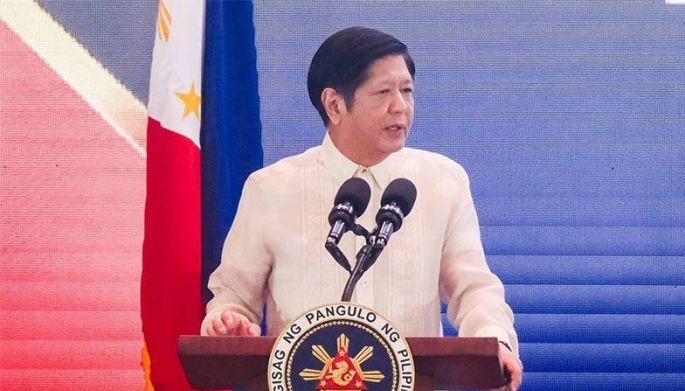MANILA, Philippines — The P6.352-trillion national budget for 2025 is set for enactment on Dec. 30 after undergoing “rigorous” examination by President Marcos and key officials, who decided to maintain some of the cuts and insertions made at the last minute by lawmakers.
The signing of the spending measure by Marcos will coincide with the country’s commemoration of Rizal Day, Presidential Communications Office (PCO) Secretary Cesar Chavez said yesterday.
“Signing on 30 December 2024 after the Rizal Day program in Manila,” Chavez told Palace reporters.
Marcos deferred the signing of the proposed 2025 General Appropriations Act because of a number of issues, including the “insertions” without appropriate documentation and the P12-billion cut in the outlay of the Department of Education. The cut in the DepEd outlay goes against the administration’s policy direction, officials said earlier.
The spending bill – ratified by Congress on Dec. 11 – was supposed to be enacted on Dec. 20.
The deferment was meant to “allow more time for a rigorous and exhaustive review of a measure that will determine the course of the nation for the next year,” Executive Secretary Lucas Bersamin said in a statement last week.
Bersamin earlier said the President is likely to veto certain items in the proposed national budget “in the interest of public welfare” and “in compliance with laws.”
Marcos met with Executive Secretary Lucas Bersamin, Finance Secretary Ralph Recto, Budget Secretary Amenah Pangandaman, National Economic and Development Authority Secretary Arsenio Balisacan and Public Works Secretary Manuel Bonoan at the Bahay Pangulo on Monday to review the spending bill. The President also met with the same officials at Malacañang on Dec. 18.
Marcos earlier vowed to restore the multibillion-peso allocation slashed from DepEd’s budget, saying the move to reduce the agency’s proposed outlay for next year goes against his policy direction.
Apart from reduction in the DepEd’s proposed budget, some sectors also criticized the removal of subsidy for the Philippine Health Insurance Corp. (PhilHealth) for next year.
The Chief Executive, however, upheld the move to give PhilHealth zero subsidy, saying it has multibillion-peso reserve funds anyway.
According to the President, the state-run health insurer has a P500-billion reserve, but the cost of providing its services in a year is just less than P100 billion.
‘Like a thief in the night’
Presidential sister Sen. Imee Marcos lamented the decision of her brother to push through with the signing of the budget program despite cuts in the allocation for education and health.
“Like a thief of the night before the New Year!” Sen. Marcos said yesterday.
She confirmed receiving an advisory from the Presidential Legislative Liaison Office (PLLO) regarding the ceremonial signing of the budget program by the President.
“The President will hold a ceremonial signing of the FY2025 GAA at 9:30 a.m. on Dec 30 in Malacañang Palace,” Marcos said in a Viber message to Senate reporters.
On Dec. 11, Congress approved the bicameral conference committee report on the P6.532-trillion national budget for 2025, retaining the cut in the Office of Vice President Sara Duterte’s budget as tensions between her and President Marcos heightened.
Both Houses also thumbed up the controversial Ayuda para sa Kapos ang Kita Program (AKAP) after senators were given their fair share from the program. The House would get P21 billion while the Senate would get P5 billion, or a total of P26 billion.
The senator warned her brother that he is not allowed under the law to realign the vetoed budget items to augment other projects, like use it to fix the Department of Education’s P11.6-billion budget cut or PhilHealth’s zero subsidy.
“If the President does line item veto, they cannot use the appropriation of the items vetoed to fund or augment other items in the budget. They will have less projects to fund, which may translate to a deficit lower than what was originally programmed – which may be a good or bad thing, depending on who’s counting,” Marcos said.
She pointed out that the P1.113-trillion budget for the DPWH is unconstitutional because it exceeded the DepEd’s P737 billion budget.
The least the President could do is to veto P188 billion worth of DPWH projects to make education the budget priority again, Marcos said.
The 1987 Constitution states that education should receive the highest budgetary allocation in the national budget.
But the vetoed DPWH funding may be factored in next year’s P531.665-billion unprogrammed appropriations, which are standby funds that can only be tapped when revenue exceeds target, the senator said.
“Unless they have a different way of computing budgetary allocations for education, at least P188-billion public works projects should be slashed so that the budget would not violate the Constitution. So there may be at least P188 billion worth of rewards in the unprogrammed appropriations for the ‘old ye faithful,’” she said.
“Those unprogrammed funds can be released only if there is excess income, or if there are new sources of funds not included in the Budget of Expenditures and Sources of Financing,” she added
The other projects earlier criticized by Senator Marcos are the P26-billion budget for the Department of Social Welfare and Development’s AKAP program and the Department of Health’s Medical Assistance for Indigent Patients (MAIP) Program, which she said can be used by politicians to court votes.
She has taken issue with AKAP, an insertion by the House of Representatives, after her falling out with her cousin, Speaker Martin Romualdez. – Marc Jayson Cayabyab, Cecille Suerte-Felipe


